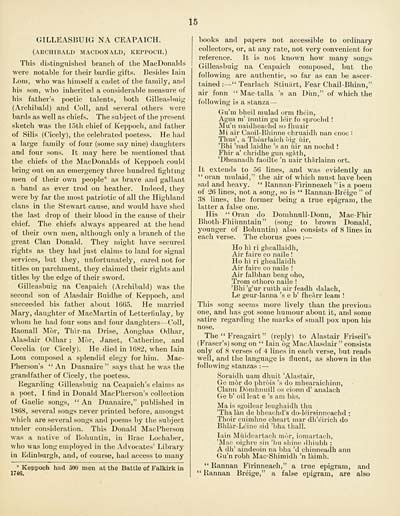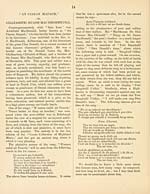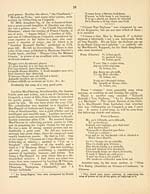Download files
Complete book:
Individual page:
Thumbnail gallery: Grid view | List view

Ì5
GILLEASBUIG NA CEAPAICH.
(ARCHIBALD MACDONALD, KEPPOCH.)
Tliis di.stinguishecl branch of the MacDonakls
were notable for their bardic gifts. Besides Iain
Loni, who was himself a cadet of the family, and
his son, who inherited a considerable measure of
his father's poetic talents, both Gilleaslmig
(Archibald) and Coll, and several others were
bards as well as chiefs. The subject of the present
sketch was the 15th chief of Keppoch, and father
of Silis (Cicely), the celebrated poetess. He had
a large family of four (some say nine) daughters
and four sons. It may here be mentioned that
the chiefs of the MacDonalds of Keppoch could
bring out on an emergency three hundred fighting
men of their own people* as brave and gallant
a band as ever trod on heather. Indeed, they
were by far the most patriotic of all the Highland
clans in the Stewart cause, and would have shed
the last drop of their blood in the cause of their
cliief. The chiefs always appeared at the head
of their own men, although only a branch of the
great Clan Donald. They might have secured
rights as they had just claims to land for signal
services, but they, unfortunately, cared not for
titles on parchment, they claimed their rights and
titles by the edge of their sword.
Gilleasbuig na Ceapaich (Archibald) was the
second son of Alasdair Buidhe of Keppoch, and
succeeded his father about 1665. He married
Mary, daughter of MacMartin of Lettertinlay, by
whom he had four sons and four daughters— Coll,
Kaonall Mòr, Thìr-na Drise, Aonghas Odhar,
Alasdair Odhar ; Mòr, Janet, Catherine, and
Cecelia (or Cicely). He died in 1682, when Iain
Lom composed a splendid elegy for him. Mac-
Pherson's " An Duanaire " says that he was the
grandfather of Cicely, the poetess.
Regarding Gilleasbuig na Ceapaich's claims as
a poet, I find in Donald MacPherson's collection
of Gaelic songs, "An Duanaire," published in
1868, several songs never printed before, amongst
which are several songs and poems by the subject
under consideration. This Donald MacPherson
was a native of Bohuntin, in Brae Lochaber,
who was long employed in the Advocates' Library
in Edinburgh, and, of course, had access to many
1 at the Battle of Falkirk in
books and papers not accessible to ordinary
collectors, or, at any rate, not very convenient for
reference. It is not known how many songs
Gilleasbuig na Ceapaich composed, but the
following are authentic, so far as can be ascer-
tained :— " Tearlach Stiuart, Fear Chail-Bhinn,"
air fonn " Mac-talla 's an Dim," of which the
following is a stanza^
Gu'm bheil mulad orm thein,
Agus m' inntin gu leir fo sprochd !
Mu'n naidheachd so fhuair
Mi air Caoil-Bhinne chruaidh nan cnoc :
Thus', a Thòiirlaich òig ùir,
'Bhi 'nad laidhe 's an ùir an nochd !
Fhir a' chridhe gun sgàth,
'Dheanadh faoilte 'n uair thàrlainn ort.
It extends to 56 lines, and was evidently an
" oran mulaid," the air of which must have been
sad and heavy. " Rannan-Firinneach " is a poem
of 26 lines, not a song, so is " Rannan-Brc-ige " of
.SB lines, the former being a true epigram, the
latter a false one.
His " Oran do Domhnnll-Donn, Mac-Fhir
Bhoth-Fhiiinntain" (song to brown Donald,
younger of Bohuntin) also consists of 8 lines in
each verse. The chorus goes : —
Ho hi ri gheallaidh,
Air faire co naile !
Ho hi ri gheallaidh
Air faire co naile !
Air falbhan beag oho,
Trom othoro naile !
'Bhi'g'ur ruith air feadh dalach,
Le geur-lanna 's e b' fheàrr leani !
This song seems more lively than the previous
one, and has got some humour about it, and some
satire regarding the marks of small pox upon his
nose.
The " Freagairt" (reply) to Alastair Friseil's
(Fraser's) song on " Iain òg Mac Alasdair " consists
only of 8 verses of 4 lines in each verse, but reads
well, and the language is fluent, as shown in the
following stanzas : —
Soraidh uara dhuit 'Alastair,
Ge mòr do phròis 's do mhearaichinn,
Clann Dòmhnuill os cionn d' analach
Ge b' oil leat e 's am bàs.
Ma is sgoilear leughaidh thu
'Tha Ian de bheachd's do-leirsinneachd ;
Thoir cuimhne cheart mar dh'èirich do
Bhlàr-Luinc sid 'bha thall.
Iain iMi'iiclcittach mòr, iomartach,
'Mar iii-luc sill 'bu shine dhiubh ;
A dli' aindeoiii na bha 'd chinneadh ann
Gu'n robh Mac-Shimidh 'n làimh.
" Rannan Firinneach," a true epigram, and
" Rannan Breige," a false epigram, are also
GILLEASBUIG NA CEAPAICH.
(ARCHIBALD MACDONALD, KEPPOCH.)
Tliis di.stinguishecl branch of the MacDonakls
were notable for their bardic gifts. Besides Iain
Loni, who was himself a cadet of the family, and
his son, who inherited a considerable measure of
his father's poetic talents, both Gilleaslmig
(Archibald) and Coll, and several others were
bards as well as chiefs. The subject of the present
sketch was the 15th chief of Keppoch, and father
of Silis (Cicely), the celebrated poetess. He had
a large family of four (some say nine) daughters
and four sons. It may here be mentioned that
the chiefs of the MacDonalds of Keppoch could
bring out on an emergency three hundred fighting
men of their own people* as brave and gallant
a band as ever trod on heather. Indeed, they
were by far the most patriotic of all the Highland
clans in the Stewart cause, and would have shed
the last drop of their blood in the cause of their
cliief. The chiefs always appeared at the head
of their own men, although only a branch of the
great Clan Donald. They might have secured
rights as they had just claims to land for signal
services, but they, unfortunately, cared not for
titles on parchment, they claimed their rights and
titles by the edge of their sword.
Gilleasbuig na Ceapaich (Archibald) was the
second son of Alasdair Buidhe of Keppoch, and
succeeded his father about 1665. He married
Mary, daughter of MacMartin of Lettertinlay, by
whom he had four sons and four daughters— Coll,
Kaonall Mòr, Thìr-na Drise, Aonghas Odhar,
Alasdair Odhar ; Mòr, Janet, Catherine, and
Cecelia (or Cicely). He died in 1682, when Iain
Lom composed a splendid elegy for him. Mac-
Pherson's " An Duanaire " says that he was the
grandfather of Cicely, the poetess.
Regarding Gilleasbuig na Ceapaich's claims as
a poet, I find in Donald MacPherson's collection
of Gaelic songs, "An Duanaire," published in
1868, several songs never printed before, amongst
which are several songs and poems by the subject
under consideration. This Donald MacPherson
was a native of Bohuntin, in Brae Lochaber,
who was long employed in the Advocates' Library
in Edinburgh, and, of course, had access to many
1 at the Battle of Falkirk in
books and papers not accessible to ordinary
collectors, or, at any rate, not very convenient for
reference. It is not known how many songs
Gilleasbuig na Ceapaich composed, but the
following are authentic, so far as can be ascer-
tained :— " Tearlach Stiuart, Fear Chail-Bhinn,"
air fonn " Mac-talla 's an Dim," of which the
following is a stanza^
Gu'm bheil mulad orm thein,
Agus m' inntin gu leir fo sprochd !
Mu'n naidheachd so fhuair
Mi air Caoil-Bhinne chruaidh nan cnoc :
Thus', a Thòiirlaich òig ùir,
'Bhi 'nad laidhe 's an ùir an nochd !
Fhir a' chridhe gun sgàth,
'Dheanadh faoilte 'n uair thàrlainn ort.
It extends to 56 lines, and was evidently an
" oran mulaid," the air of which must have been
sad and heavy. " Rannan-Firinneach " is a poem
of 26 lines, not a song, so is " Rannan-Brc-ige " of
.SB lines, the former being a true epigram, the
latter a false one.
His " Oran do Domhnnll-Donn, Mac-Fhir
Bhoth-Fhiiinntain" (song to brown Donald,
younger of Bohuntin) also consists of 8 lines in
each verse. The chorus goes : —
Ho hi ri gheallaidh,
Air faire co naile !
Ho hi ri gheallaidh
Air faire co naile !
Air falbhan beag oho,
Trom othoro naile !
'Bhi'g'ur ruith air feadh dalach,
Le geur-lanna 's e b' fheàrr leani !
This song seems more lively than the previous
one, and has got some humour about it, and some
satire regarding the marks of small pox upon his
nose.
The " Freagairt" (reply) to Alastair Friseil's
(Fraser's) song on " Iain òg Mac Alasdair " consists
only of 8 verses of 4 lines in each verse, but reads
well, and the language is fluent, as shown in the
following stanzas : —
Soraidh uara dhuit 'Alastair,
Ge mòr do phròis 's do mhearaichinn,
Clann Dòmhnuill os cionn d' analach
Ge b' oil leat e 's am bàs.
Ma is sgoilear leughaidh thu
'Tha Ian de bheachd's do-leirsinneachd ;
Thoir cuimhne cheart mar dh'èirich do
Bhlàr-Luinc sid 'bha thall.
Iain iMi'iiclcittach mòr, iomartach,
'Mar iii-luc sill 'bu shine dhiubh ;
A dli' aindeoiii na bha 'd chinneadh ann
Gu'n robh Mac-Shimidh 'n làimh.
" Rannan Firinneach," a true epigram, and
" Rannan Breige," a false epigram, are also
Set display mode to: Large image | Transcription
Images and transcriptions on this page, including medium image downloads, may be used under the Creative Commons Attribution 4.0 International Licence unless otherwise stated. ![]()
| Early Gaelic Book Collections > Ossian Collection > Macdonald bards from mediaeval times > (25) |
|---|
| Permanent URL | https://digital.nls.uk/80460701 |
|---|
| Description | Selected books from the Ossian Collection of 327 volumes, originally assembled by J. Norman Methven of Perth. Different editions and translations of James MacPherson's epic poem 'Ossian', some with a map of the 'Kingdom of Connor'. Also secondary material relating to Ossianic poetry and the Ossian controversy. |
|---|
| Description | Selected items from five 'Special and Named Printed Collections'. Includes books in Gaelic and other Celtic languages, works about the Gaels, their languages, literature, culture and history. |
|---|

